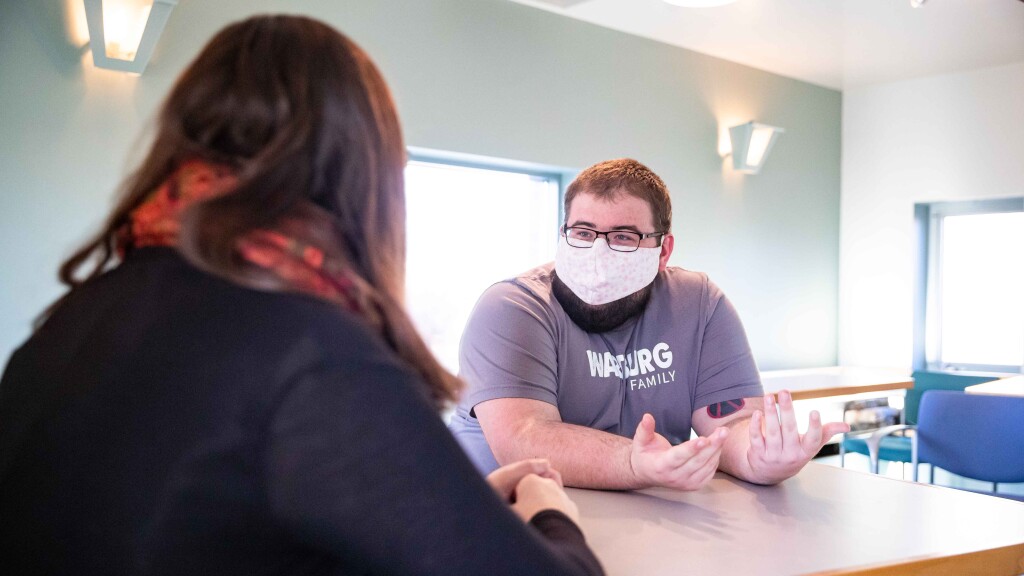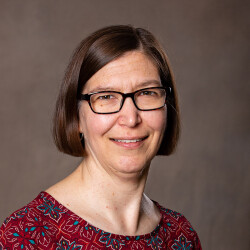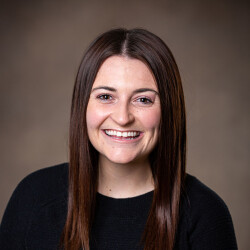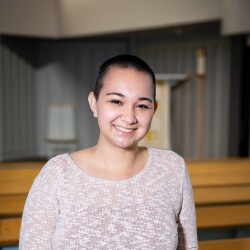
By Emily Christensen | Photos by Julie Pagel Drewes ’90
As a high school student, Kellie Escovy ’21 never thought she would be able to follow her dream of someday leading a church congregation.
“After I graduated from high school, I knew that my finances wouldn’t allow me to go straight to a four-year university, so I spent my first year working and taking community college classes. I felt called to some kind of ministry, but I didn’t think ordained ministry would be possible for me because I couldn’t afford eight years of school to get there,” she said.
According to 2017-18 data from the Association of Theological Schools, new pastors graduating with a Master of Divinity have student debt averaging $54,600, which means they would need to make more than $60,000 in their first year of service to meet monthly payoff guidelines. Clergy, on average, make just over $50,000, with brand-new pastors often earning markedly less.Wartburg’s Accelerated Ministry Program (AMP), a partnership between the college and Wartburg Theological Seminary in Dubuque, streamlines the preparation for pastoral ministry in the ELCA for first-career ministerial students, reducing the number of years they spend in school and the amount they pay for that education.
Escovy, of Katy, Texas, was one of the first students admitted into the program and is one of three planning to complete their undergraduate degrees at the end of this academic year.
“I came to Wartburg College because of the Accelerated Ministry Program,” she said. “Not only does AMP streamline education and cut off two years of tuition costs, it has a three-year paid internship built in and provides amazing financial aid while I pursue my B.A.”
The program aims to reduce tuition for students so that, when they begin serving congregations, they are less burdened by educational debt incurred at the college or seminary. These scholarships are funded by a nearly $500,000 grant from the Kern Family Foundation and more than $500,000 in scholarship gifts to date, including $375,000 from supporters O. Jay and Pat Tomson of Mason City and more than $125,000 from alumni and friends of the two Wartburg institutions.
“There is an ever-present need for new pastors to fill the vacancies in our Lutheran parishes created by normal retirement of clergy,” said the Tomsons. “As the number of individuals graduating from our affiliated seminaries has continued downward, there has become an obvious need to reverse this trend. Tuition and living costs associated with seven to eight years of formal education are expenses that are very onerous for candidates for a Master of Divinity degree and most often require assuming a significant amount of related debt. It is very difficult to repay given the limited income that is earned by newly ordained pastors, even over an extended period of time.”
During their three years at Wartburg College, students in the program can choose from a variety of undergraduate majors in addition to religion, but will still build community within their cohort and pursue experiential learning on and off campus.



“The Accelerated Ministry Program walks with young servant-leaders through intentional discernment, spiritual growth, and leadership opportunities,” said Dr. Kristin Wendland ’00, assistant professor of religion and the AMP academic adviser. “Students who are already discerning a call to rostered ministry value these offerings along with the excellent academic programs for which both schools are known.”
Students spend the final three years of the program serving in a congregation while completing their master’s studies through Wartburg Seminary’s digital learning platform. Students completing the program earn both a bachelor’s and a master’s degree in six years instead of eight.
“I am so excited to start working in a church community next year,” said Escovy. “While I’ve been at Wartburg College in the Accelerated Ministry Program, one of our biggest goals has been to build intentional community with one another. So, as I move into my internship I will be bringing over theological education from my religion classes, and I will be able to continue the practice of building Christian community.”
Another benefit AMP provides is an individualized approach for each of the 15 students currently enrolled in the program through one-on-one mentoring. Escovy said that, in addition to the financial aid and intentional communities, her favorite part of AMP is the mentoring component.
“The overall hope for the program is to remove obstacles for young people who are discerning a call to ministry,” said Samantha Pfab ’20, Accelerated Ministry Program associate, who directs AMP student programming and serves as a resource to current and prospective students. “The church needs young, passionate leaders, and this program is a phenomenal way to assist students in their goals as future clergy.”
